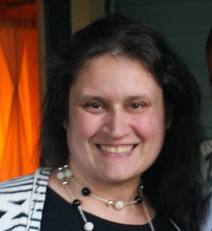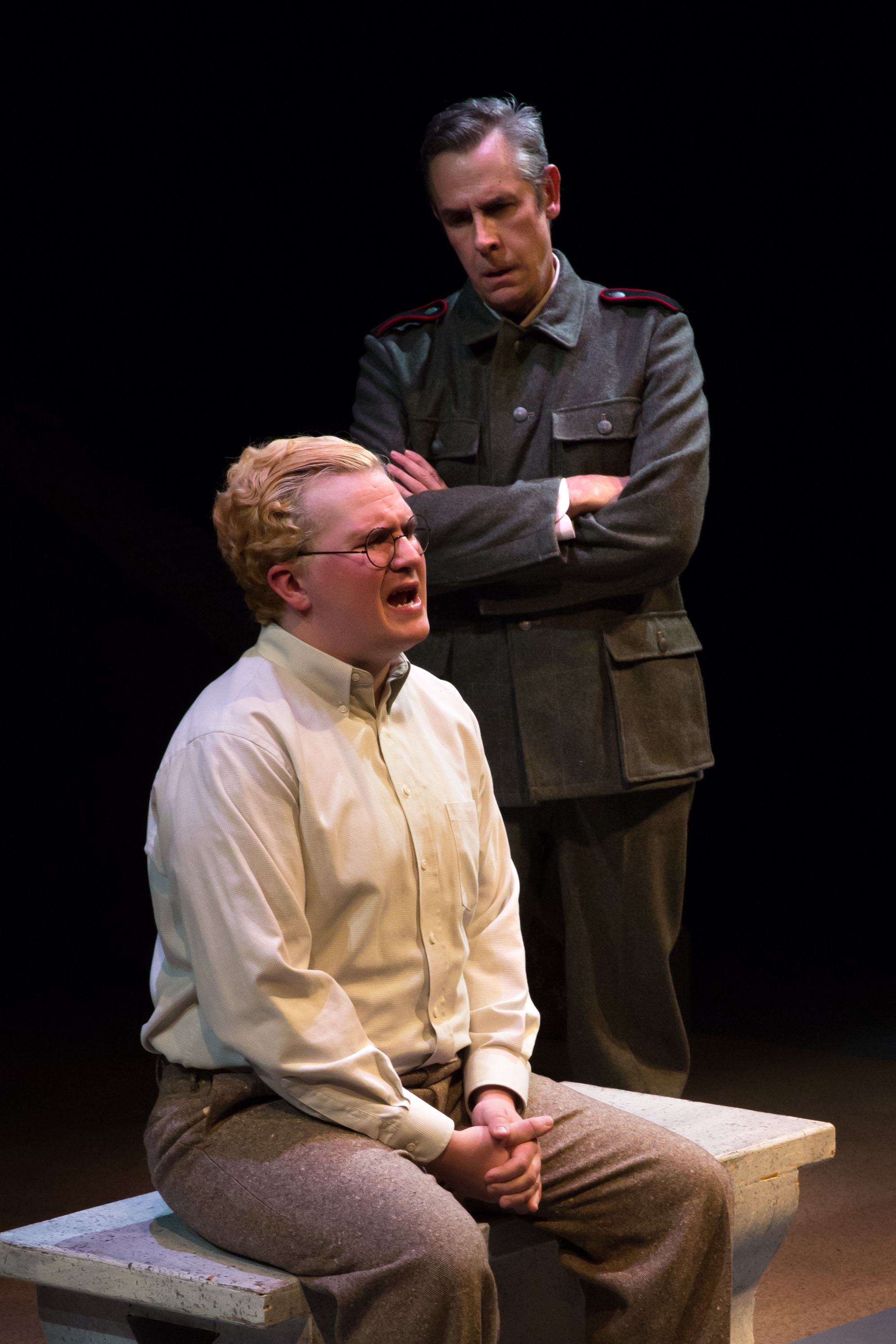Chase Gregory & Ted Leslie in Bonhoeffer – The Last Encounter
Photo-Bunbury Theatre
Bonhoeffer, The Last Encounter
Written and Directed by Juergen K. Tossmann
Review by Annette Skaggs
Entire contents copyright © 2015 by Annette Skaggs. All rights reserved.
Think back to when you were in your Social Studies or History class. Do you remember any reference to Dietrich Bonhoeffer? I was lucky enough to have learned a bit about him when I was in college, not as a History minor, but in my Theology class. Herr Bonhoeffer was in fact Pastor Bonhoeffer, a prominent theologian and a member of the Resistance during the time of Hitler’s Germany, World War II.
Bonhoeffer, the man, published many books about Theology, including the influential The Cost of Discipleship, which is still read and referenced today. In tandem with his Sacred beliefs, he fought for the rights of those that he saw were oppressed and the indignities that they suffered, not just in Germany, but also in America, where he studied at Union College in New York City for a time. It was in New York that he met an African-American pastor by the name of Adam Clayton Powell, who introduced young Bonhoeffer to the eye opening realm of Social Justice, thus setting the course for his life.
Fast-forward a few years to 1941. Germany begins to invade other countries, has asked all people of Jewish descent to wear stitched Yellow Stars on their clothes and Japan attacks Pearl Harbor. It is during this time that Bonhoeffer is forbidden to print or publish any of his Ecumenical writings by the German government, while he secretly continues activities in his Underground Churches, including working with the Resistance. In January 1943, Bonhoeffer proposes to Maria von Wedemeyer, but on April 5th he is arrested and incarcerated at Tegel Prison in Berlin. And this is where Bonhoeffer, The Last Encounter begins.
As music pipes through the theater, the lights rise to reveal two individuals, Klaus (Matt Orme), chained to a prison wall and Bonhoeffer (Chase Gregory) sitting in a chair with chains around his wrists. Overhead a disembodied voice (Juergen Tossmann) talks to the prisoners without revealing why they are there. It is clear Klaus has been there for some time and is hardened while Bonhoeffer is perplexed as to why he is there but accepts the situation for what it is and begins to pray for Klaus.
In the next scene we see that Bonhoeffer has a bit more freedom as he is no longer shackled and is in a cell complete with a bed and writing desk. Soon a guard, Corporal Heinrich (delightfully played by Ted Lesley) comes in with books and writing paper, even inquiring if Bonhoeffer wanted anything to eat. Clearly, Bonhoeffer was being treated a little differently than what we would imagine a prisoner to be treated. Throughout the play it was entertaining to watch as Bonhoeffer and Heinrich became closer as friends and even confidants. The exchanges are often enlightening and intriguing, borrowing from excerpts of Bonhoeffer’s papers and writings. I am quite impressed with Mr. Gregory’s portrayal of Bonhoeffer, both as a person of strong conviction, but also as an orator. Much of his dialogue is rich in dogma and ecumenical belief of self and social equality, but also in the often-asked question of identity: Wer Bin Ich? Who Am I?. He handles that with aplomb, not to mention he looks a little bit like Bonhoeffer too.
Bonhoeffer received a letter from his friend Frank Fisher, a fellow seminarian whom he met while in America, who introduced him to the aforementioned Rev. Powell, which then segued into one of the most impassioned moments of the evening. In a moment of reflection we meet the good Reverend and experience the sermon that probably changed Bonhoeffer. Let me just say, I felt I had gone to church in that moment. It was as if Clydetyrone Harper was directly channeling Rev. Powell. A hint to the audience: embrace the impassioned resonance of this scene, it will enhance the experience, I assure you.
Through the friendship that had developed with Heinrich, Bonhoeffer was allowed to see his fiancée Maria (Courtney Glenny). During the courtyard rendezvous the couple spoke of a possible escape plan, all within earshot of the Corporal. It was shortly after that encounter that Bonhoeffer is then sent to a Gestapo Prison and further questioned by the Nazi SS.
While Bonhoeffer sits in a chair, chained once again with an interrogator’s light shining on him, one by one Klaus, Maria, Rev. Powell, and Heinrich tell the tale of Bonhoeffer’s final days and execution. Then, darkness.
I believe that if scene changes were tightened up a bit and more work done with the German dialogue, Mr. Tossmann could very well take this production to other cities/theaters. It is a well thought out and riveting story of a man who tried to right the wrongs of humankind in the name of God and Social Justice. I will state though that I had a couple of questions concerning the timeline of events, but I will ask him personally.
I recommend this play not as a history lesson, but to learn how and why Bonhoeffer is eternally placed amongst the Saints and Martyrs, such as Rev. Martin Luther King, Jr., at Westminster Abbey. In the words of Bonhoeffer: “It is our task to hope so unconditionally that our hope in the spirit of love may be a source of strength for others.”
Bravo Tutti
Bonhoeffer, The Last Encounter
April 9 – 26, 2015 (No performance April 18)
Bunbury Theatre
At The Henry Clay Theatre
604 Third Street
Louisville, KY 40202
Bunburytheatre.org
 [box_light]Annette Skaggs is a heavily involved Arts Advocate here in Louisville and freelance professional opera singer who has performed throughout Europe, St. Louis, Cincinnati, Boulder, Little Rock, Peoria, Chicago, New York and of course Louisville. Aside from her singing career she has been a production assistant for Kentucky Opera, New York Opera and Northwestern University. She has a 25+ year knowledge of the Classical Arts.[/box_light]
[box_light]Annette Skaggs is a heavily involved Arts Advocate here in Louisville and freelance professional opera singer who has performed throughout Europe, St. Louis, Cincinnati, Boulder, Little Rock, Peoria, Chicago, New York and of course Louisville. Aside from her singing career she has been a production assistant for Kentucky Opera, New York Opera and Northwestern University. She has a 25+ year knowledge of the Classical Arts.[/box_light]



